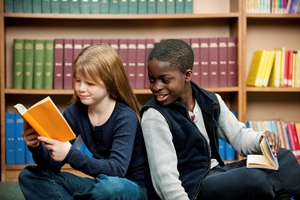 Anyone who has ever read to or with a child—parent, family member, teacher or friend—knows books leave lasting impressions. Beyond the educational benefits, books have the power to instill empathy, affirm, teach, transport and inspire action. Books matter.
Anyone who has ever read to or with a child—parent, family member, teacher or friend—knows books leave lasting impressions. Beyond the educational benefits, books have the power to instill empathy, affirm, teach, transport and inspire action. Books matter.
Empathy
In exposing children to other people’s stories and the motivations and feelings behind those narratives, children begin to connect with others on an emotional level, which is the foundation for bridging differences between worlds. Books have the power to foster empathy and understanding of other people and cultures–their hopes and dreams, their joys and sorrows, their stories and reflections. Empathy is the groundwork for understanding people who are different from oneself. Books open those doors for children to other places and experiences.
Self-Reflection
Parents and educators know that one of the most important things books do for children is affirm who they are. Commonly referred to as “mirror” books, they contain reflections of the children—their culture, family, race, religion, etc.—and enable them to see themselves portrayed with accuracy, depth and complexity. As Charles Blow, a writer and op-ed columnist for the New York Times shared about books, “They helped me to see myself and love myself when I felt least seen and least loved. They saved me.” Through books, children should be able to see themselves take on endeavors–both ordinary and extraordinary. Positive identity development is crucial during childhood and when children don’t see themselves in books and elsewhere, they feel devalued and less optimistic.
Unfortunately, there is often a lack of diversity in children’s books. Although children of color make up about 40% of the population, recent statistics show that the number of children’s books featuring people of color has been hovering around 10% for the past several years. Other types of diversity—including ability, socioeconomic status and LGBT people and families—are also lacking. There has been an acknowledgment of this problem and an outcry in the education and literature worlds to address it. A recent New York Times article asked, “Where are the people of color in children’s books?” The concept of “We Need Diverse Books” quickly evolved from a hashtag to an organization, and in 2015, the John Newbury Medal winning children’s books all featured an aspect of diversity. There is growing awareness but change is slow.
Teach and Transport
“Window” books have the power to teach children about aspects of life for which they are unfamiliar. They can shed light on people who are different in a myriad of ways– religion, family structure, ability, race or country of origin. In small and big ways, books can illuminate differences between people and reveal how bias is sometimes caused by misunderstanding. Poignant words and illustrations transport children into new realms and experiences. Through books, they may learn about someone who is deaf or autistic. They can gain familiarity with the experiences of immigrants from other countries or those who have family constellations different from their own. They may learn about different cultures and their holiday celebrations. Helping children gain comfort with differences has lasting benefits.
Action
When children are faced with bias and bullying, it can be difficult for them to know what to do. Books can help and they often resonate with children in ways nothing else does. As young people look for strategies to deal with teasing and bullying, they can also discover books that help them learn how to be an ally. Stories about people who stand up to prejudice and injustice can inspire children to see themselves in others who have fought for justice, especially child and youth activists.
Whether it’s a nineteenth century suffragette, a Holocaust resister or a Nobel prize winningPakistani girl fighting for girls’ education, through books we can teach children about the world outside themselves, the history of injustice and how they can make a difference.

